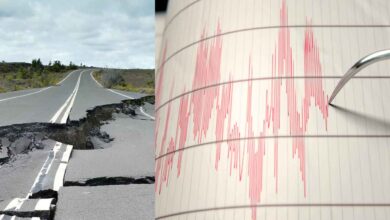The World Reacts To Trump’s Tariffs And Its Not Sunny. Macron Calls For Suspension Of Investments In US , Canada Slaps 25% Tariffs On US Cars, And For Apple-Its Back To Square One!

The global reaction to Trump’s so-called “Liberation Day” tariffs has been swift, and the sentiments are – gloom, doom! Markets nosedived, trade war alarms rang out, and while world leaders raised eyebrows (and tariffs), Trump remained unfazed.
President Trump rolled out sky-high tariffs, some as steep as 99%, on America’s trading partners. His goal, to slash the $1.2 trillion goods trade deficit and bring manufacturing back home. But the shockwaves are hitting hardest in poorer countries, and global leaders aren’t impressed.
India’s been slapped with a 27% reciprocal tariff starting April 9. That’s actually better than its regional peers, as China is looking at a combined 54%, Vietnam is staring down 46%, and Indonesia’s tagged with 32%. Still, India says it’s “carefully examining” the fallout and sniffing around for potential opportunities too.
While Trump’s MAGA base cheered, critics warned that the tariffs could throw the U.S. economy into a tailspin – triggering inflation, hurting consumers, and possibly dragging the country into a recession. The global stock markets didn’t take it lightly either. Uncertainty and fear over tit-for-tat moves sent them into a tumble.
And the tit-for-tat is here.

Canada Fires Back, 25% Tariff on US Cars
Canada’s Prime Minister Mark Carney, in a clear rebuttal, announced a 25% tariff on all U.S. vehicle imports that don’t comply with the free trade agreement. The twist here is that the money from these tariffs will go straight into a fund to support Canadian auto workers and keep their industry afloat.
He also said that even U.S. vehicles that meet the Canada-US-Mexico Agreement (CUSMA) standards would be taxed – specifically on any part of the vehicle not made in Canada or Mexico. Again, the revenue would support Canadian workers.
Carney made it a point to say that Canada’s approach was more measured. “Our tariffs, unlike President Trump’s, will not affect auto parts,” he posted on X, hinting that Canada values its integrated supply chain.
He didn’t mince words when calling the U.S. tariffs “unjust,” adding that the global economy “is fundamentally different today than yesterday.”
Here’s how things escalated:
—March 4: U.S. slaps 25% tariffs on Canadian goods + 10% on energy and potash exports.
—March 12: U.S. adds 25% tariffs on Canadian steel and aluminum.
—April 3: U.S. hits Canadian automobiles with a 25% tariff, directly targeting a sector that employs over 500,000 Canadians.
—Coming up: A 25% tariff on certain U.S. auto parts is expected by May 3.

Macron Hits Pause on U.S. Investments as Trump’s Tariff Storm Gathers Force
Taking a step further, France’s Emmanuel Macron is urging European companies to hit the brakes on new investments in the U.S. until “things are clarified” – aka until the tariff chaos settles.
Speaking to French industry leaders on Thursday, Macron said,
“Investments to come or investments announced in recent weeks should be suspended.”
That’s a bold move, especially considering that just a few weeks ago, French shipping giant CMA CGM unveiled plans to pour $20 billion into U.S. infrastructure, a move Trump personally praised.
Another big player, Schneider Electric, recently committed $700 million to help power America’s growing AI-driven energy needs. Now, both those deals may be in limbo.
Macron called Trump’s tariffs “brutal and unfounded,” warning that they were a blow to global trade and that Europe needs to fight back “industry by industry.” He floated the idea of using the EU’s anti-coercion tool – basically a big red button that lets the bloc retaliate when pushed too far.
But he didn’t stop there.
Macron said Europe may also look at hitting the U.S. where it hurts – its digital services and financial systems. And unlike previous, more measured responses to steel and aluminum tariffs, he hinted that this time, the counterpunch would be “more powerful.”

Germany, Time to Push Back, Hard
Over in Berlin, acting German economy minister Robert Habeck had his own gloves off. He said Trump “will buckle under pressure” if Europe presents a united front.
“This pressure now needs to be unfolded… and then we will see who is the stronger one in this arm wrestle,” Habeck declared.
He made it clear that trying to play nice or waiting for Trump to come around wouldn’t work. Europe needs to act, and act decisively. He even called this a “day of determination.”
Habeck also used the moment to pitch some long-term thinking – Europe should stop depending on others and start investing more strategically, especially in areas like cloud infrastructure, AI, and space tech. He drew a hard lesson from Germany’s past over-reliance on Russian energy, warning against repeating that kind of “blindness.”
Scholz Slams Trump’s Tariffs as a Global Misstep
Meanwhile, outgoing Chancellor Olaf Scholz joined the chorus, calling the U.S. tariffs “fundamentally wrong” and accusing Trump of “poorly thought through decisions” that would hurt not just the U.S., but the entire global economy.
Germany, more than most, has a lot to lose here. It’s heavily reliant on exports and the U.S. happens to be its top trade partner, even ahead of China. In 2024, bilateral trade between the two totaled over €250 billion. Trump’s new 20% tariff policy slaps fresh levies on goods from the EU, including Germany, making a direct hit on one of Europe’s strongest economies.
EU Gears Up for Counterpunch as Trump’s Tariff Storm Ripples Through Global Markets and Wine Glasses
The European Union is not just watching from the sidelines. After U.S. President Donald Trump unveiled his sweeping “reciprocal tariffs” this week, European Commission President Ursula von der Leyen stated: Brussels is prepping countermeasures – just in case Washington doesn’t come back to the table.
“We are prepared to respond,” von der Leyen said Thursday. “We are now preparing for further countermeasures, to protect our interests and our businesses if negotiations fail.”
But she also extended a diplomatic olive branch, urging a shift “from confrontation to negotiation.” In other words: we’ll talk, but don’t expect us to take this lying down.
All of this comes as Trump’s tariff wave sends tremors across world markets. Stock prices tumbled globally on Thursday, with businesses and governments scrambling to assess the fallout. The era of open global trade, it seems, is facing a serious stress test.

When Tariffs Hit the Bottle
Among the earliest casualties, from bubbly champagne to Guinness stout, and even Italy’s iconic Campari, Trump’s new tariff regime is hitting the global spirits industry hard, and U.S. drinkers might be footing the bill.
The new rules include:
—A 25% tariff on all imported beer
—Tariffs on beer cans, adding to aluminum costs
—Tariff threats that hovered over Mexican tequila and Canadian whisky (though not imposed—for now)
—European wines, liqueurs, and spirits—many of which are now too pricey to serve at the neighborhood bar
So it will not be surprising if Negroni or Cognac gets a little more expensive, or disappears entirely from the menu.
According to spiritsEurope, European spirits exports to the U.S. totaled €2.9 billion in 2024. That’s a lot of bottles, and a lot of U.S. jobs, too, tied to distribution, retail, and restaurants.
Wine Regions Wince, Layoffs Loom
French officials are warning of a 20% drop in sales and job losses in regions like Cognac, which rely heavily on exports to the U.S. The Spanish Wine Association chimed in too, saying there’s no other market big enough to replace lost American demand.
Micaela Pallini, president of Italy’s Federvini, put it plainly: “Many labels, which cannot be replaced by local production, will disappear from the tables of U.S. consumers.”
Even Japanese drinks maker Suntory is adjusting its sails—focusing instead on markets closer to home.
Hard Choices Ahead
Tammy Curtis, senior VP at one of America’s largest spirits distributors, said what many are thinking – “There will be winners and losers.”
Big brands may be forced to raise prices by 2% to 5%, or take a direct hit to profits, according to UBS analysts. Either way, tough decisions lie ahead.
The U.S. Wine Trade Alliance also pointed out a bitter twist – American wine businesses might suffer more than their foreign counterparts, as consumers balk at higher prices and skip the second glass altogether.
Trump Tariffs Tighten Grip on Global Supply Chains
From Bordeaux to Bengaluru, Trump’s reciprocal tariff shockwave is leaving no sanctuary untouched. What once looked like smart supply chain diversification by global giants like Apple, or survival strategies by wine and spirits exporters, now looks like a trap with no exit.
Apple’s Supply Chain Chessboard Is Now a Minefield
Few companies have been as lauded for their manufacturing pivots as Apple. Having diversified from China to India, Vietnam, Malaysia, and other regional hubs, Apple had seemingly built a resilient and forward-looking strategy to avoid the geopolitical frictions that scarred its first dance with Trump’s tariffs. But with Trump’s new blanket tariffs targeting exactly those alternative countries, Apple is back to square one, only this time, it’s even worse.
Shares in Apple tumbled over 9% on Thursday, wiping out more than $300 billion in market cap, their worst day since the pandemic’s early chaos in March 2020. For context, that’s more value lost in a day than most countries’ GDPs.
“There’s nowhere to escape,” said Erik Woodring, a Morgan Stanley analyst. He estimates Apple might need to hike U.S. prices by 17-18% across product lines just to offset the new tariffs. But there’s no clarity on whether the company will absorb the costs, raise prices, or try to wrangle exemptions.
The company, notably silent, offered no comment beyond CEO Tim Cook’s vague January remark: “We are monitoring the situation.”
Apple’s November filing paints a worrying picture. Nearly all its suppliers – from Taiwan and Japan to India and Vietnam – now sit under tariffs ranging from 24% to 46%. China, Apple’s manufacturing backbone, faces a punishing 54% tariff.
Trump, in his announcement, pointed directly at Apple, saying, “they’re going to build their plants here.” Yet history and economics argue otherwise. The company has long resisted mass manufacturing in the U.S., with the late Steve Jobs reportedly telling Obama in 2011, “Those jobs aren’t coming back.”
And analysts agree – at least not anytime soon. “It would take 3 years and $30 billion just to move 10% of Apple’s supply chain to the U.S.,” said Wedbush analyst Dan Ives.





